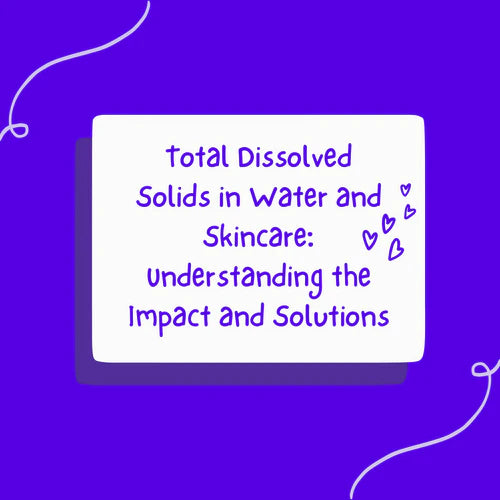

· By filter genius
Total Dissolved Solids in Water and Skincare: Understanding the Impact and Solutions
When it comes to skincare, the quality of water we use can have a major impact on the health and appearance of our skin. One important aspect of water quality is the presence of Total Dissolved Solids (TDS), which can affect the skin in various ways. In this blog post, we will explore the science behind TDS in water, its effects on the skin, and solutions recommended by leading dermatologists to maintain healthy skin.
The Science of Total Dissolved Solids (TDS)
TDS refers to the total amount of dissolved inorganic and organic substances present in water. These substances can include minerals, salts, and other dissolved compounds. TDS levels can vary depending on the source of the water and the treatment it has undergone.
According to the World Health Organization (WHO), TDS levels in drinking water should be less than 300 mg/L. Water with TDS levels above this threshold can be considered "hard water," which can lead to various issues, including skin irritation, dryness, and eczema.
The Effects of TDS on the Skin
TDS levels in water can have a number of effects on the skin, including:
-
Dryness: High TDS levels can cause the skin to become dry, as the minerals and other dissolved substances can strip the skin of its natural oils.
-
Irritation: High TDS levels can cause skin irritation, redness, and itching.
-
Eczema: According to a study published in the Journal of Dermatological Science, hard water can be a risk factor for eczema, an itchy, red skin condition.
-
Acne: High TDS levels can cause an overgrowth of bacteria on the skin, which can lead to acne.
Solutions for Reducing TDS
According to leading dermatologists, there are several solutions for reducing TDS levels in water to maintain healthy skin:
-
Use an ultrafiltration water filter: An ultrafiltration water filter, specifically a reverse osmosis filter, can help to remove TDS and impurities from water.
-
Use a shower head filter: A shower head filter can help to remove TDS and impurities from water, which can be particularly beneficial for people with sensitive skin.
-
Use distilled water: Distilled water is free from impurities, including TDS, which can be helpful for skin that is particularly sensitive to TDS.
-
Keep your skin hydrated: Drinking plenty of water and using a hydrating moisturizer can help to keep the skin hydrated and counteract the drying effects of TDS.
-
"As a dermatologist, I always recommend my patients to use filtered water for their skincare routine to reduce the risk of irritation and dryness caused by high levels of TDS in water. Also, keeping skin hydrated and using a gentle, non-irritating cleanser can help to maintain healthy skin," said Dr. Jane Buckle, a renowned clinical aromatherapist and author.
Conclusion
The quality of water we use can have a major impact on the health and appearance of our skin, and TDS levels in water can affect the skin in various ways. To maintain healthy skin, it is important to reduce TDS levels in water by using an ultrafiltration water filter, a shower head filter, distilled water, and keeping the skin hydrated.
